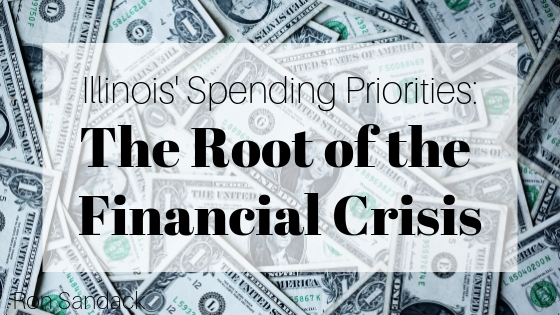Illinois has not had a properly balanced budget since 2001, but a lax budget is not the reason behind their overall financial crisis. The root of their financial crisis is misguided spending priorities. Even when they had a relatively balanced budget, it merely provided lawmakers with more room to spend money on their misplaced priorities, their priority being pensions, government workers health care, Medicaid, and state worker benefits; leaving them little room to pay unpaid bills or support other core government functions such as higher education and other programs. Let’s lay out a timeline.
1994: Governor Jim Edgar
In 1994, the governor at the time, Jim Edgar, initiated a bipartisan bill that was painted as a reform for the pension deficit with at the time clocked in at 15 billion dollars. Lovingly referred to as the Edgar Ramp, instead of structurally reforming budgets and the pension deficit, it pushed the obligation in the future, as far as 2045. The bill would keep pension payments low for the first 15 years, after which they would begin to “ramp” up.
2009-10: Quinn Administration
Around this time, the pension contributions started to spike due to the Edgar Ramp. Instead of working towards structural reform, Governor Quinn would borrow billions of dollars to pay for the pension deficits. This time revealed a significant budget flaw – that proceeds from borrowing could be counted as revenue. So basically, billions of dollars of debts could make the budget seemed balanced.
2011: Balanced Budget?
In 2011, the General Assembly passed what people thought was a balanced budget, but housed one billion dollars in unfunded spending on health care payments and Medicaid. This year, a 67% income tax hike and 46% corporate income tax hike was put into motion. Lawmakers told Illinoisians that these tax hikes would help generate increased revenue that would help stabilize the pension crisis and pay off state bills. Needless to say, their dreams did not come true.
2015-18: No Budget
For two fiscal years, Illinois was without a budget at all due to disagreements between the newly elected governor, Bruce Rauner, and House Speaker, Michael Madigan. These two were unable to come to a consensus on what a balanced budget would look like. Rauner insisted that he uphold the objectives that he campaigned on and Madigan insisted that tax increases were necessary. During this two year impasse, the Illinois State Board of Education was the only state agency that received a full budget.
Illinois is consistently trying to pass off unbalanced and irresponsible budgets as the answer to their fiscal crisis when in reality they have misplaced spending priorities and are simply over-spent. These budgetary gimmicks can only last so long before they need to face that what they have needed all along was deep structural reforms.

